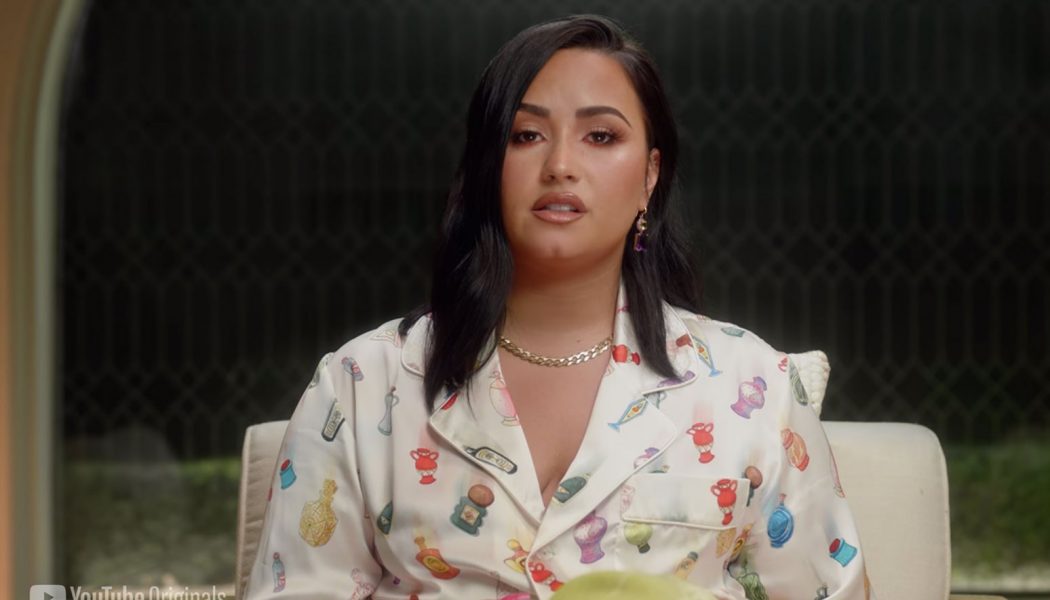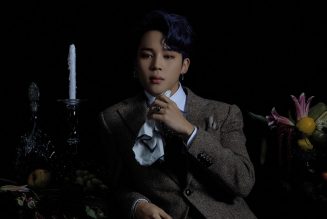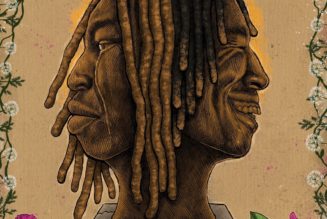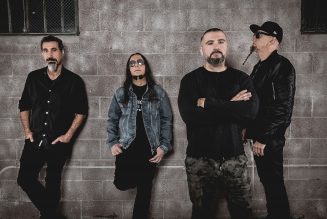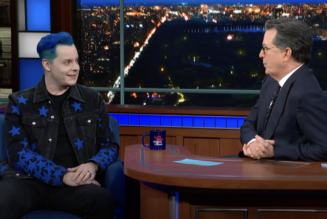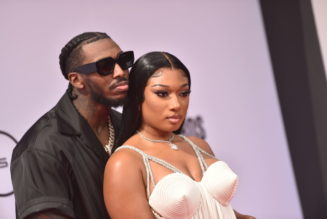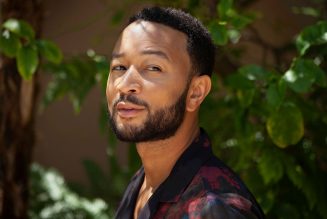
Even from the trailer she released on Feb. 17, fans couldn’t begin to wrap their heads around how much damage Lovato had suffered from her overdose, including three strokes, a heart attack and blind spots in her vision that don’t allow her to drive anymore.
Dancing With the Devil, directed by Michael D. Ratner, is not a by-product of her discarded 2018 documentary. It has a completely different foundation, refocusing her narrative from center stage — as seen in snippets of the previous performance-heavy feature Lovato says would’ve only captured the “tip of the iceberg” — and opening up the floodgates about her 2018 overdose while the cameras began rolling again in 2020. The anecdotes are so harrowing that YouTube Originals featured trigger warnings regarding addiction, mental health, eating disorders and sexual abuse ahead of each episode.
With the entire docuseries having premiered at SXSW on March 16, and ahead of the first two episodes making their debut March 23 on YouTube Originals, here are the 10 biggest revelations we learned from Dancing With the Devil.
Father’s Day Triggers Her Fear About Her Biological Father’s Death
Her biological father Patrick Lovato, who died in June 2013, also struggled with alcohol and addiction on top of bipolar and schizophrenia. Lovato notes no one in her family knows the exact date of his passing because his body, which she added had been discovered a week and a half after his death, was “too decomposed” upon discovery for an open-casket funeral.
She says she spends every Father’s Day contemplating which day he passed away on. “And then also knowing that by the time Father’s Day rolls around, he was just laying there, rotting,” she says. “That was the fear I always had for him was that he would end up alone — and he did. He died alone.” The singer had been estranged from her father since 2007 after witnessing him abuse her mother, Dianna De La Garza, who wrote about it in her 2008 memoir Falling With Wings: A Mother’s Story.
She Wrote “Sober” Shortly After Her Introduction to Hard Drugs
One month after DJ Khaled and Kehlani celebrated Lovato’s six-year anniversary of her sobriety at a March 16, 2018-dated concert, Lovato confesses in the doc that she relapsed with alcohol and drugs one month after the show. “I’m surprised I didn’t OD that night,” she recalls of the night she picked up a bottle of red wine and contacted someone she knew would have drugs on them.
“I ended up at a party. I just so happened to run into my old drug dealer from six years before,” she continues. “That night, I did drugs that I had never done before. I had never done meth before — I tried meth. I mixed it with molly, with coke, weed, alcohol, oxytocin. And that alone should have killed me.”
Her dear friends, Matthew Scott Montgomery and Sirah, emphasize her secrecy about that night and how it plays into her pattern of hiding details from her family and friends. “The thing was is that we really didn’t know about the drugs,” Sirah says during her interview portion.
Lovato shares that two weeks after the party, she was introduced to heroin and crack cocaine. While on a trip to Bali, she realized she had a physical dependency on the hard drugs and wrote her June 2018 somber anthem “Sober”; performed it on tour that wrapped by July. By the time she returned to L.A., she began heavily using again. “That is one thing that I was very good at is hiding the fact that I was addicted to crack and heroin,” Lovato says, her eyes flitting across the floor.
Her Assistant’s 911 Call Saved Her Life
On the morning of July 24, 2018, Lovato’s assistant at the time, Jordan Jackson, discovered the singer’s immobile body in her bed and called head of security and chief of staff Max Lea in a panic. While Jackson describes more people rushing into the house, she recalls sneaking downstairs out of fear of “[getting] in trouble for calling 911.” She had been alerted by someone in Lovato’s home to instruct the operator that there be no sirens, but the operator said he had no control over the matter.
In his interview, Lea commends Jackson for her action, adding he was “quite impressed” with how she handled the emergency. The medics who arrived quickly administered Narcan, a nasal spray version of naloxone that reverses the effects of an opiate overdose, before rushing the performer to the hospital.
“I’m really lucky to be alive,” Lovato, who suffered what one of her physicians said was “multiple organ failure,” reflects while thinking about what the doctors had told her. “My doctors said that, like, I had five to 10 more minutes, and had my assistant not come in, I wouldn’t be here today.”
Lovato’s Inability to Recognize Her Little Sister Was Part of a Full-Circle Moment
Her younger sister Madison De La Garza describes the moment she first saw Lovato in the hospital and grabbed her hand. “And she looked me dead in the eye, and she said, ‘Who is that?’” De La Garza tells the camera.
Lovato woke up legally blind following her heroin overdose, and she remembers asking her younger sister who she was, which caused De La Garza to start sobbing because, according to the artist, “she thought from then on, I was not going to be able to see.” One of Lovato’s doctors, neurologist Dr. Shouri Lahiri, explains with Lovato by his side in an interview that one of the initially affected areas of her brain were the vision centers.
Lovato calls it “ironic and in a weird way, poetic” that she couldn’t physically recognize her little sister. The reason, she explains, is that one of the reasons why she first became sober was because her parents said she couldn’t see De La Garza, despite her best efforts to want to have a relationship with her younger sibling. “God has a twisted sense of humor sometimes,” Lovato chuckles while blotting away her tears.
There Are More Layers to the Night She Overdosed
Toward the end of the second episode, Lovato says that on the night of July 23, 2018, she didn’t just overdose.
“I’ve had my fair share of sexual trauma throughout childhood, teenage years. And when they found me, I was naked. I was blue,” Lovato says of the morning following the visit from the man who supplied her drugs. “I was literally left for dead after he took advantage of me.”
Despite telling her doctors that she had had consensual sex, the singer adds it wasn’t until a month after her overdose that she realized she was not “in any state of mind to make a consensual decision.”
When the Going Got Tough, Scooter Braun Got Going
While Lovato stayed in The Cirque Lodge rehabilitation facility shortly following her overdose, she told her longtime business manager Glenn Nordlinger that she wanted to get back into music under the condition that new management would be in place. Having been managed by Phil McIntyre since she was a teenager, Lovato purposefully sought out Scooter Braun, who currently oversees Justin Bieber and Ariana Grande, and who had meticulously planned out how he would say no to Lovato because he felt “overwhelmed.”
But once the two sat down together, he knew she not only needed a manager, but she also needed a friend, and Braun was willing to be both. “I am an artist who just overdosed on heroin. I’m kind of a liability,” Lovato admits in the doc while sitting next to Braun. “I don’t know if people are going to want to work with me.”
He was adamant on figuring out what treatments worked and didn’t work for her, who was her support system, and where she was in her recovery process.
Her Overdose Wasn’t the Last Time She Used Heroin
“I wish I could say that the last night that I ever touched heroin was the night of my overdose, but it wasn’t,” Lovato says while setting the record straight about her relapse following a brief pause in the third episode.
After a weeklong intensive trauma retreat, the singer called the same man who had previously given her what she believes to be fentanyl-laced “after-market pills” and later allegedly took advantage of her the night she overdosed. “I wanted to rewrite his choice of violating me. I wanted it now to be my choice,” she declares while facing the camera head on. “And he also had something that I wanted, which were drugs. And yeah, I ended up getting high. I thought, ‘How did I pick up the same drugs that put me in the hospital?’ I was mortified at my decisions.”
She also remembers calling her dealer back and asserting, “No, I’m going to f— you” as a way to take her power back. But the singer adds it only brought “me back to my knees of begging to God for help.”
Rihanna’s 2009 Assault Made Her Uncomfortable Coming Forward About Her Own
Prior to Dancing With the Devil, Lovato had only briefly hinted at being sexually abused in her 2013 song “Warrior,” which starts off with the lyric, “This is a story that I have never told.” She told Cosmopolitan for her August 2017 cover that she’ll tell the story behind “Warrior” when she’s ready.
At first, she cites the pictures coming out of Rihanna and Chris Brown’s assault case as making her “very uncomfortable with even more of my story playing out in the press and also maybe people not believing me.” Lovato later begins telling the story of how she lost her virginity “in a rape” as a teenager. And similarly to her situation with the dealer, she called the person back a month after “and tried to make it right by being in control, and all it did was just make me feel worse.” Archival footage of her Camp Rock 2: The Final Jam days and an old interview around that time reveal how aware a young Lovato quickly became of needing to her protect herself in the industry.
“I was a part of that Disney crowd that publicly said they were waiting till marriage,” she notes about the pressure she faced in the PG environment as a “little child star role model.” Without naming anyone, the actress adds how difficult it was to see the person who raped her all the time while they never faced any consequences, such as being taken out of the movie they were filming.
It all took a physical toll on her, as her bulimia worsened to the point where she was vomiting blood. In finally disclosing her #MeToo story, Lovato encourages others to speak out, saying, “I’m coming forward about what happened to me because everyone that it happens to should absolutely speak their voice if they can and feel comfortable doing so.”
Ending Her Engagement Changed How She Viewed Her Sobriety
Due to the pandemic, the singer had to film her own interview segments, and she ended up documenting one of her biggest milestones in her life when she got engaged to now ex-fiancé Max Ehrich in July after the couple began dating in May. But a minute after she breaks the happy news during the fourth and final episode, her demeanor switches completely from ecstatic to earnest when discussing how they broke off their engagement and how she hadn’t picked up any hard drugs to cope.
Another minute passes, and self-taped footage from the same night as the previous clip reveals a tearful Lovato expressing how she “missed the person I started quarantining with.” Quarantine not only impacted how she filmed her discussions about her relationship, but also how rapidly it had evolved, leaving her feeling “just as shocked” as the rest of the world after getting to know Ehrich better.
But the impact of her high-profile breakup impacted how she perceived her sobriety. “I’ve learned that it doesn’t work for me to say, ‘I’m never going to do this again,’” she explains of her personal discipline. She expresses her desire to seek relief from smoking marijuana or having a glass of wine, but telling herself those options are completely off the table feels like she’s setting herself up for failure.
After hesitantly admitting she occasionally smokes joints and drinks wine now, Lovato cautions viewers that she’s not endorsing a “one-size-fits-all solution” for recovery after years of being upheld as the “poster child of sobriety.” Elton John, who celebrated 30 years of being sober last summer and hopes Lovato also experiences the “most incredible things” in life while in recovery, puts it simply in the doc that, when discussing sobriety, “moderation doesn’t work.”
But her recovery case manager Charles Cook begs to differ, saying he hopes a takeaway from the docuseries is that no one path to sobriety looks the same for each person. Cook and Lovato also elaborate on the precautions she’s put in place, such as taking the Vivitrol shot, an injection of naltrexone that blocks the opiate receptors and is used to prevent relapses.
“The one slipup that I ever had with those drugs again, the scariest thing to me was picking up heroin and realizing, ‘Wow, this isn’t strong enough anymore.’ Because what I had done the night I overdosed was fentanyl. And that, that’s a whole other beast,” she says while slightly shaking her head. “Realizing the high I wanted would kill me was what I needed to get me clean for good.”
She Was Misdiagnosed With Bipolar Disorder
Lovato has been incredibly vocal about mental health issues ever since the then-18-year-old star revealed to ABC News’ Robin Roberts that she had been diagnosed with bipolar in 2011. Now, a full decade later, she’s revealing that that is thought to have been a misdiagnosis.
“I came out to the public when I found out I was bipolar because I thought that it put a reasoning behind my actions,” she explains, while an old headline pops up about Lovato leaving the Jonas Brothers tour after hitting a backup dancer. “I know now from multiple different doctors that it was not because I was bipolar. And I had to grow up. I had to grow the f— up.”
If you or anyone you know is struggling with mental health and substance abuse disorders, contact Substance Abuse and Mental Health Services Administration (SAMHSA) by calling 1-800-622-HELP (4357). For those who are experiencing suicidal thoughts and/or distress, the National Suicide Prevention Lifeline is available 24/7 at 1-800-273-8255. People struggling with eating disorders can call the National Eating Disorders Association (NEDA) Hotline at 1-800-931-2237. If you or someone you know has been sexually assaulted, contact the Rape, Abuse & Incest National Network (RAINN) Sexual Assault Hotline at 1-800-656-HOPE (4673).
